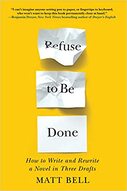| Matt Bell advocates three major drafts in novel writing in his craft book, Refuse to Be Done. He says: The first draft is to discover the book I’m writing by writing the book.
|
For the second draft, he suggests a reverse outline:
- write a full outline of the novel, outlining what already exists.
- Once the outline is complete, I revise it, not the novel, until the outline becomes a plan for the better book I want to write.
- The aim here is to discover what you’ve already done and then think of how you might better take advantage of the inherent qualities in the structure
- The trick of the second draft is to recapture or re-create the magic that inspired the novel in the first place, but to do so with the fullness of the style you developed by the time you reached the end.
For the third draft:
- On your first pass, highlight in one color every sentence in which you explain something [exposition: try to streamline or eliminate]
- With a different color, do a pass where you highlight every instance of backstory. [Try to streamline or delay/eliminate]
- For your next pass, highlight the weakest sentence [or weakest clause in each paragraph: try to eliminate]
- Next highlight the strongest sentence in each paragraph . . . lift the surrounding prose to the same level
- Highlight any passages where you feel yourself being genuinely moved…feel some kind of emotional, intellectual, moral, or esthetic jolt [also note where you feel nothing]
I find this highlighting technique helpful in my own revision process, but many of his suggestions (such as retyping the second and third drafts from scratch) didn’t resonate with me. I didn't purchase this book (I borrowed it from the library), though it did have a lot of useful ideas.
His overall message: revision and rewriting are most of what good writing entails…the sustained and often small-scale work of making a promising manuscript better hour by hour, day by day, slowly but steadily moving it closer to your imagined ideal. Read more from Matt Bell on the practice of writing.
His overall message: revision and rewriting are most of what good writing entails…the sustained and often small-scale work of making a promising manuscript better hour by hour, day by day, slowly but steadily moving it closer to your imagined ideal. Read more from Matt Bell on the practice of writing.


 RSS Feed
RSS Feed